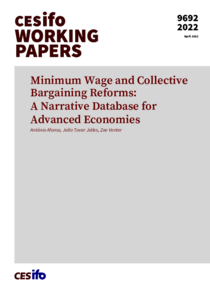Minimum wage and collective bargaining reforms: a narrative database for advance economies

Afonso, António ; Jalles, João Tovar ; Venter, Zoe
CESifo - Munich
2022
23 p.
minimum wage ; collective bargaining ; labour market policy ; labour productivity
CESifo working paper
9692
Wages and wage payment systems
English
Bibliogr.
"This paper presents and describes a new database of major minimum wage and collective bargaining reforms covering 26 advanced economies over the period 1970-2020. The main advantage of this dataset is the precise identification of the nature and date of major reforms, which is valuable in many empirical applications. Based on the dataset, major changes in minimum wages have been more frequent than in collective bargaining in the last decades, and the majority of these were implemented during the 1980s and 1990s. In our empirical application, we find that minimum wage reforms have a medium-run positive impact on labor productivity and they lead to a fall in the unemployment rate. Collective bargaining reforms do not seem to affect either productivity or capital formation but they have a clear medium-term effect on the labor market. Moreover, collective bargaining reforms are more sensitivity to the prevailing business cycle conditions at the time of the reform (vis-à-vis minimum wage reforms)."
Digital
The ETUI is co-funded by the European Union. Views and opinions expressed are however those of the author(s) only and do not necessarily reflect those of the European Union or the ETUI.